You may keep a large number of business and personal contacts on your iPhone. Once lost contacts on your iPhone 6/5S/5C/5/4S/4/3GS , or deleted contacts on your iPhone by careless,your job as well as daily life will be impacted more or less. One of several advantages to make use of iPhone is the fact that iTunes may automatically back up your iPhone contacts and update it when you synchronize it. Which means you obviously have a large possiblity to recover iPhone lost contacts through iTunes back-up.
Accidentally deleted contacts from iPhone? Have a broken iPhone or even lost your iDevice? Lost your iPhone contacts after upgrading to iOS 9/iOS 8? No matter why your data’s in jeopardy, this use guide teach you how to get your iPhone contacts back in three ways with the help of two powerful iPhone Contacts Recovery.
Recovering lost and deleted contacts from an iPhone directly with two iPhone Data Recovery
| Part 1: Recover iPhone Contacts with Dr.Fone iPhone data recovery Part 2: Restore iPhone Contacts with FoneLab iPhone Data Recovery |
Part 1: Recover iPhone Contacts with Dr.Fone iPhone data recovery
The first iPhone data recovery: Dr.Fone iPhone Data Recovery for Windows and Dr.Fone iPhone Data Recovery for Mac,both can help you recover all lost contacts on iPhone, iPad and iPod touch, including the iPhone 11/XS/XR/X/8/7/6S/6/5S/5/4S and iOS 14/ iOS 13.This iPhone data recovery provides you three ways to recover contacts directly from your iPhone, iTunes or iCloud backup file. Either way, you can clearly preview all lost or deleted contacts before recovery, and selectively recover whatever only what you want—something you can't do with iTunes!
Download the free trial version below for taking a try.


The Key Features of Dr.Fone iPhone Data Recovery:
-Newly support data recovery from iCloud backup and encrypted iTunes backup.
-Restore iPhone lost data, like photos, videos, contacts, messages, notes, call log, voicemail, voice memos, calendars, reminders, etc.
-Recover data from apps like iPhoto, iMovie, Flickr, Kindle, Instagram, and more.
-Works for iPhone 11/XS/XR/X/8/7/6S/6/5S/5/4S, all iPads and iPod touch 5/4.
-Recover iPhone data lost due to accidental or intentional deletion, device damage or system crash, etc.
| Part 1: Recover from iOS |
| Part 2: Recover from iCloud |
| Part 3: Recover from iTunes |
Step 1. Connect iOS Device with Computer
Use the USB cable that comes with your iOS device to connect your iPhone, iPad or iPod touch, to your computer. Then launch Dr.Fone on your computer and choose "Data Recovery".
.jpg)
Once the program detects your device, it will show you the window as follows.
.jpg)
Tips: Before running Dr.Fone, you're supposed to download the latest version of iTunes. To avoid the automatically sync, don't launch iTunes when running Dr.Fone. I suggest you to disable the automatical syncing in iTunes beforehand: launch iTunes > Preferences > Devices, check “Prevent iPods, iPhones, and iPads from syncing automatically”.
Step 2. Scan Your Device for Lost Data on It
Simply click the "Start Scan" button to let this program scan your iPhone, iPad or iPod touch to scan for deleted or lost data. The scanning g process may last a few minutes, depending on the amount of data on your device. During the scanning process, if you see that the data you're looking for is there, then you can click the "Pause" button to stop the process.
.jpg)
Step 3. Preview and Recover the Scanned Data
The scan will take you some time. Once it's completed, you can see a scan result generated by the program. Data both lost and existing on your device are displayed in categories. To filter out the deleted data on your iOS device, you can swipe the option "Only display the deleted items" to ON. By clicking the file type in the left side, you can preview the found data. And you can see there is a search box on the top right of the window. You can search for a specific file by typing a keyword in the search box. Then save the data to your computer or your device by clicking the recovery button.
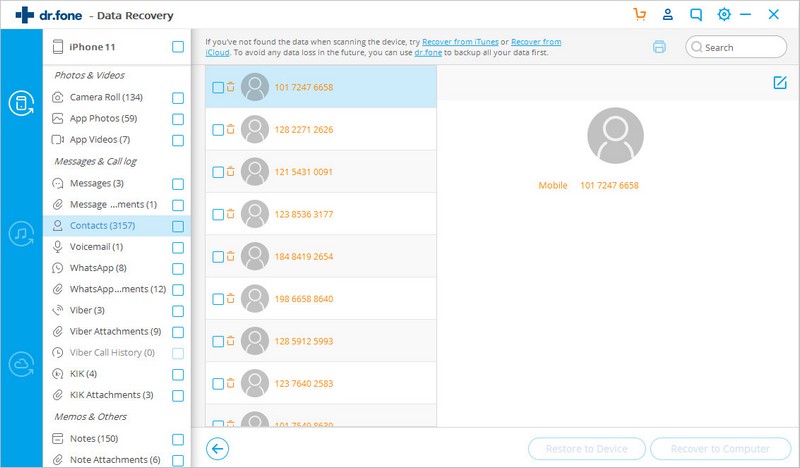
Tips: About recovering data
When you find the data you need, just put the check mark in front of the box to select them. After then, click the "Recover" button at the bottom right of the window. By default, the recovered data will be saved to your computer. As for text messages, iMessage, contacts, or notes, when you click Recover, a pop-up will ask you to "Recover to Computer" or "Recover to Device". If you want to put these messages back to your iOS device, click "Recover to Device".
Step 1. Choose Recovery Mode
After running Dr.Fone, choose "Data Recovery" and click on it.
.jpg)
Then choose "Recover iOS Data".
.jpg)
After that, you can see there options for you to do data recovery. Choose "Recover from iCloud Backup Files". Then you'll see the window below. Enter your iCloud account and password to login. Dr.Fone takes your privacy seriously. We never keep a record of any your Apple account info or content at any time during your sessions.
.jpg)
Step 2. Download iCloud Backup File
When you logged into iCloud, the program can find all iCloud backup files in your account. Choose the one where you're going to recover data and click on the "Download" button.
.jpg)
And then in the pop-up, you can choose the type of files you would like to download. This will reduce the time of downloading the iCloud backup file. After that, you can scan the iCloud content now. Click on the "Next" button to start downloading. It will take you some time. Just wait for a moment.
.jpg)
Step 3. Preview and Recover Data from iCloud Backup File
The scan will be complete in a few minutes. Once it stops, you can preview almost all data in your iCloud backup file, like contacts, messages, photos, and more. Check them one by one and tick the item you want. Then click on the "Recover to Computer" or "Recover to your device" button to save them on your computer or your device with one click.
Now contacts, messages and notes can be directly recovered to your iOS device if your iPhone, iPad or iPod touch is connected with your computer with a USB cable during the recovery process.
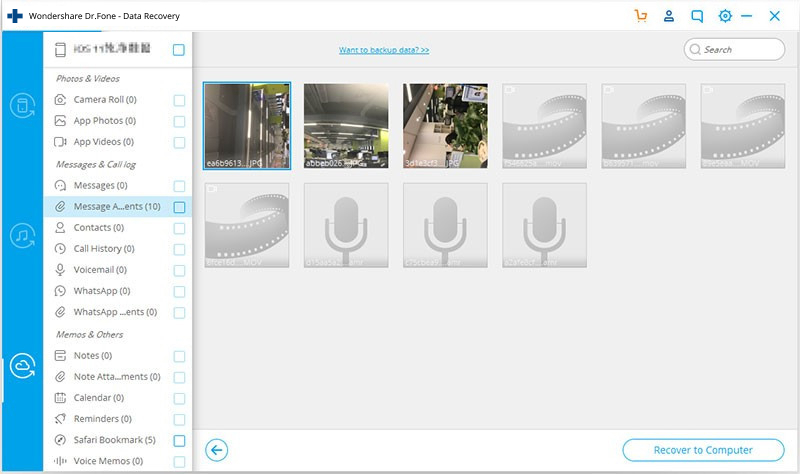
Tips: Directly preview and recover data from downloaded iCloud backup files
If you have downloaded iCloud backup files previously, you don't need to sign in and get off the iCloud backup file again. Click "To preview and scan previously downloaded iCloud backup file" under the account sign-in entrance.
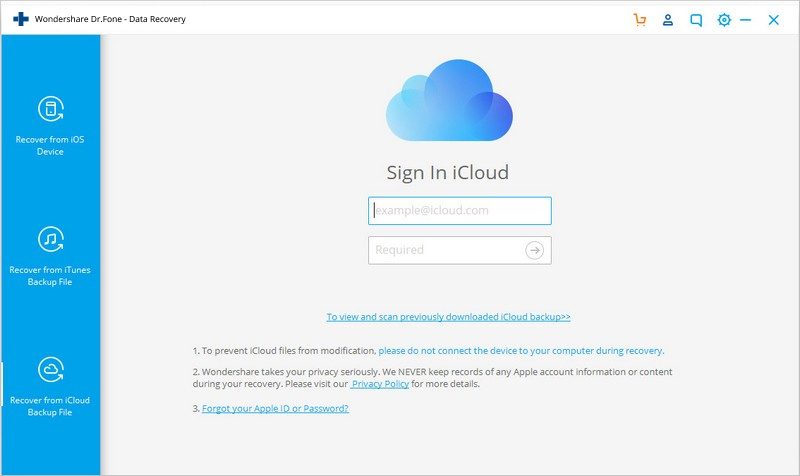
Then you can see all downloaded iCloud backup files displayed in a list. You can choose any of them to extract the content. All these downloaded backup files are located on your own computer. If you don't need them any more, you can click on the trash icon beside the scan button to delete them completely.
.jpg)
Step 1. Choose Recovery Mode
Launch Dr.Fone and click "Data Recovery".
.jpg)
Then choose "Recover iOS Data".
.jpg)
You can see three options on the side here. Choose "Recover from iTunes Backup File". After then, the iTunes backup recovery tool will detect all iTunes backup files on this computer and display them in the window. You can confirm which one is the one you need according to the date it has been created.
.jpg)
Step 2. Scan Data from iTunes Backup File
Choose the iTunes backup file that contains the data you want to recover and click "Start Scan". It will take a few minutes to extract all data from the iTunes backup file. Be patient.
.jpg)
Step 3. Preview and Recover Data from iTunes Backup
After a few seconds, all data in the backup file will be extracted and displayed in categories. You can preview them one by one before recovery. Then you can selectively mark and recover those you want by pressing the "Recover" button at the bottom. Now contacts, notes and messages can be directly recovered to your iOS device if you keep your iOS device connected with your computer via a USB cable during the recovery process.
Tips: you can see there is a search box in the result window. From there, you can type in the name of a file to search for it.
.jpg)
Tips: What if your iTunes backup file is located somewhere else?
When your iTunes backup file comes from somewhere, such as moved from another computer with a USB drive, how can you preview and get the content from it? There is a way. When you are at the first step, click "Select" under the list of iTunes backup files, and you can flexibly choose the iTunes backup file no matter where you place it.
.jpg)
Then in the pop-up window, preview and target your iTunes backup file. Then click "Start Scan" and you can move on with the step 2 above. It's pretty useful feature.
.jpg)
Free download the Dr.Fone iPhone Data Recovery:
.png)
.png)
How iTunes back up your iPhone contacts
As being an iPhone user, just who is likely to manage the content of iPhone using iTunes, have to know that iTunes backs up almost everything of your iPhone first when you synchronize with it. This is the awesome point once you lost your contacts from iPhone. The bad point is the back-up file is just not normal file type, but a SQlitedb file, that is not permitted to preview, even access. Oftentimes it’s protected, only for private safe.
Part 2: Restore iPhone Contacts with FoneLab iPhone Data Recovery
There exists certainly 3 ways, however, you require an FoneLab iPhone iPad Data Recovery for Windows or FoneLab iPhone iPad Data Recovery(Mac), which provide 3 ways to restore lost iPhone contacts, also can help you to recover photos, text messages, Note, Video, Call logs, Memos and Calendars, even Safari bookmarks from iPhone, iPad directly or iTunes/iCloud backup.


1 Launch Program
First of all, you should download and install the program on your computer. And then Launch it. Both PC and Mac versions are available.
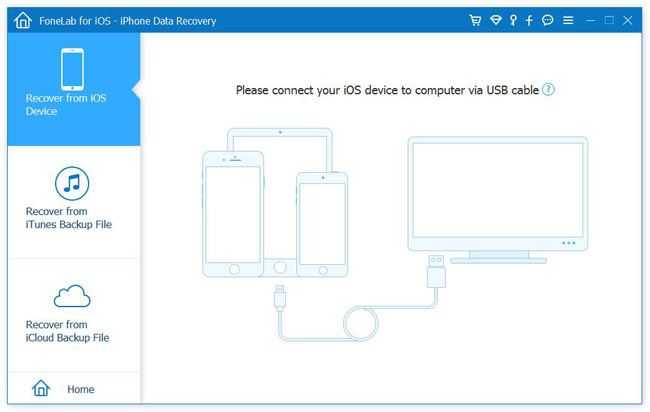
2 Scan Data
There are three recovery modes:
◆ For Recover from iOS Device mode, connect you device to computer via USB cable, and then click Start Scan.
◆ For Recover from iTunes Backup File mode, select an iTunes backup file from the backup list, and then click Start Scan.
◆ For Recover from iCloud Backup File mode, log in iCloud with your Apple ID and password, and then select an iCloud backup file from the backup list to scan.
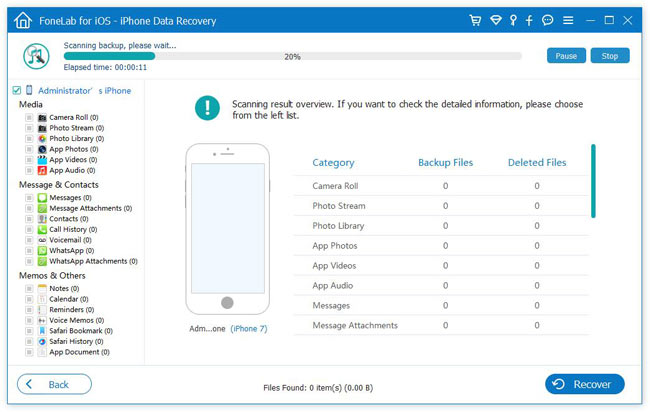
3 Select Data
Click the file type in the left panel to preview the details, and then check the boxes of the data which you want to recover.
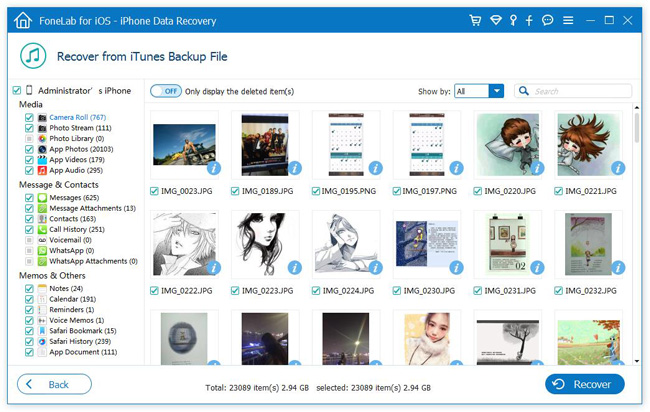
4 Recover Data
Click the blue Recover button in the bottom right corner. The retrieved data will be saved to your computer.
.jpg)
Backup iPhone Contacts before Upgrading or Jail-breaking
Before you upgrade or jailbreak your iOS devices like iPhone, iPad and iPod Touch, don't forget to backup your iOS data from loss because you never know what will happen when upgrading or jailbreaking your device. For example, upgrading to an old iOS version may result in deletion of all multimedia tracks as well as pictures in the Camera Roll. Although Apple claims that their beta testers have been putting iOS 14 through its paces for months, but better safe than sorry. If you are intending to turn your devices into iOS 14, be sure to copy all your files from loss. But how to backup iOS files? Editor here recommend you two methods: save iOS data with iTunes backup or backup iOS device data with iPhone Data Manager ( iPhone Data Transfer software ). But we highly recommend you the second way. Why? FoneLab for iOS can recover all data (some data you may delete before, but this software can find them back!) from iOS devices. Backup data with iTunes allows you just save current files of iOS devices.